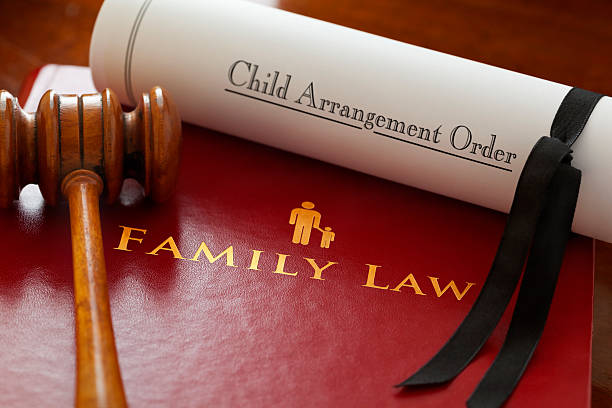Untying the Knot: Crafting a Positive Co-Parenting Plan

Resolving Conflict with Compassion: Family Law Mediation
June 2, 2023
Get Help Through Kern County Family Court
June 6, 2023Going through a divorce or separation is undoubtedly challenging, and when children are involved, the complexity of the situation grows even further. As parents, it is our responsibility to put the needs and well-being of our children first, even in the midst of emotional turmoil. Crafting a positive co-parenting plan is a crucial step towards providing stability and security for your children during this transition.
In this article, we will explore the importance of a positive co-parenting plan, delve into the legal aspects surrounding co-parenting, and provide practical tips for creating a comprehensive agreement that promotes cooperation and nurtures the well-being of your children.
Table of Contents:
- Introduction
- The Importance of a Positive Co-Parenting Plan
- Building a Foundation of Communication and Cooperation
- Navigating the Legal Aspects of Co-Parenting
- Protecting the Best Interests of the Child
- Ensuring a Safe Environment
- Securing Your Child’s Future
- Creating a Comprehensive Co-Parenting Agreement
- Establishing a Parenting Schedule
- Coordinating Decision-Making Responsibilities
- Financial Support and Child-Related Expenses
- Resolving Disagreements Through Mediation
- Frequently Asked Questions (FAQs)
- Conclusion
- Reach Out to Thompson Law
- Relevant Hashtags
The Importance of a Positive Co-Parenting Plan
A positive co-parenting plan serves as a roadmap for navigating the complexities of shared parenting after separation or divorce. It establishes clear guidelines and expectations for both parents, fostering open communication, cooperation, and mutual respect. By prioritizing the needs of your children and working together, you can create an environment that supports their emotional and psychological development.
Building a Foundation of Communication and Cooperation
Successful co-parenting begins with open and honest communication between both parents. Although it may be challenging, it is essential to put personal differences aside and focus on what is best for your children. Regularly discuss your children’s well-being, educational progress, and any concerns or issues that arise. Respectful and effective communication sets the stage for a positive co-parenting relationship.
Cooperation is equally crucial. Collaborate on decisions regarding your children’s education, healthcare, and extracurricular activities. By involving both parents in these discussions, you ensure that important choices are made in the best interests of your children.
Navigating the Legal Aspects of Co-Parenting
When it comes to co-parenting, various legal aspects need to be considered to protect the rights and well-being of your children. Seeking the guidance of an experienced family law attorney is highly recommended to ensure compliance with applicable laws and to safeguard your children’s interests.
Protecting the Best Interests of the Child
Family law encompasses a range of legal matters related to children, including custody, visitation, and child support. A family law attorney can help you understand your rights and responsibilities, guide you through the process of establishing a parenting plan, and advocate for the best interests of your child in court, if necessary.
Ensuring a Safe Environment
Ensuring a safe environment for your children is of utmost importance. If you have concerns about your co-parent’s behavior or suspect any form of abuse or neglect, consulting with a criminal law attorney is essential. They can provide guidance on reporting incidents, obtaining restraining orders if necessary, and taking appropriate legal action to protect your children’s well-being.
Securing Your Child’s Future
Considering estate planning and probate is crucial to secure your child’s future. By working with an attorney experienced in this area, you can establish a will or trust that ensures your assets are protected and designated for the benefit of your children. This step provides peace of mind knowing that your children’s financial well-being is taken care of in case of unfortunate events.
Creating a Comprehensive Co-Parenting Agreement
A comprehensive co-parenting agreement lays the foundation for a successful co-parenting relationship. Here are some key elements to consider when crafting your plan:
Establishing a Parenting Schedule
A clear and consistent parenting schedule is essential for stability and predictability in your children’s lives. Consider your children’s ages, school schedules, and extracurricular activities when creating a schedule that accommodates their needs. Flexibility and understanding are crucial, as adjustments may be required from time to time.
Coordinating Decision-Making Responsibilities
Decisions regarding your children’s education, healthcare, religion, and other important matters should be addressed in your co-parenting plan. Determine how these decisions will be made collaboratively, ensuring both parents have a voice and are involved in the process.
Financial Support and Child-Related Expenses
Child support is a critical component of a co-parenting plan. Consult with a family law attorney to understand the guidelines and regulations in your jurisdiction. Establish a plan for sharing child-related expenses, such as education, healthcare, extracurricular activities, and child care.
Resolving Disagreements Through Mediation
Even with the best intentions, disagreements may arise during the co-parenting journey. Including a provision for mediation in your co-parenting plan can be instrumental in resolving conflicts and finding mutually agreeable solutions. Mediation allows for a neutral third party to facilitate discussions, helping parents work through differences and maintain a positive co-parenting relationship.
Frequently Asked Questions (FAQs)
Q: What if my co-parent and I cannot agree on a parenting plan?
A: If you and your co-parent are unable to reach an agreement on your own, seeking the assistance of a family law attorney or mediator can help facilitate the process and find a resolution that serves the best interests of your children.
Q: Can a co-parenting plan be modified?
A: Yes, a co-parenting plan can be modified if circumstances change or if the existing plan is no longer effective. Consult with a family law attorney to understand the legal requirements and steps involved in modifying your plan.
Q: How can I ensure a healthy co-parenting relationship?
A: Prioritize open and respectful communication, cooperation, and focusing on the best interests of your children. Consistency, flexibility, and seeking professional guidance when needed can contribute to a healthier co-parenting dynamic.
Conclusion
Untying the knot and embarking on the journey of co-parenting can be overwhelming, but with a positive co-parenting plan, it is possible to create an environment that nurtures the well-being of your children. By focusing on effective communication, cooperation, and seeking legal guidance when necessary, you can build a foundation for a successful co-parenting relationship.
If you need assistance with family law matters, criminal law issues, or estate planning and probate, reach out to Thompson Law. With over 14 years of experience, our team of dedicated attorney and paralegals can provide the guidance and support you need.




